Few people enjoy beating a dead horse more than I do, but man, beating up on Microsoft Windows is simply no fun anymore…because everybody’s doing it.
The defining company of the PC era — which for the purposes of this discussion we’ll consider the 25 years from 1981 to 2006 — has not articulated a unique and compelling vision for the future of computing since the iPhone rocked it to its core in 2007. ~ Tom Krazit, Gigaom
Yup, that about sums it up.
The first part of this two-part series will focus on what’s gone wrong with Microsoft Windows. Next week, I’ll conclude the series by focusing on why Microsoft is in this position and what, if anything, they can do to resuscitate the dead horse that is Windows.
Let Me Count The Ways
So, exactly how badly is Microsoft losing in the personal computing space? Let me count the ways:
1) PCs are in decline;
2) Mobile is ascendant;
3) Windows Phone 8 sales have been disappointing;
4) Windows RT sales have been disappointing;
5) Microsoft Surface sales have been disappointing;
6) Third-party Windows 8 tablet sales have been disappointing;
7) Ultrabook sales have been disappointing;
8) Windows 8 adoption has been disappointing;
9) Microsoft App Store growth has been disappointing;
10) Business and Enterprise is moving on without Microsoft’s products or services;
11) Microsoft has lost its monopoly and its monopoly powers; and
12) Microsoft is dependent upon legacy products – Windows and Office – for the bulk of its profits.
No reasonable person is arguing that Microsoft is going away. What rational people ARE contending is that Microsoft is becoming irrelevant in the front end – the consumer facing portion – of the personal computing space.
How did it come to this?
1) PCs Are In Decline
If you don’t cannibalize yourself, someone else will. ~ Steve Jobs
Evidence of the PCs decline is indisputable and, frankly, no one is trying to dispute it.
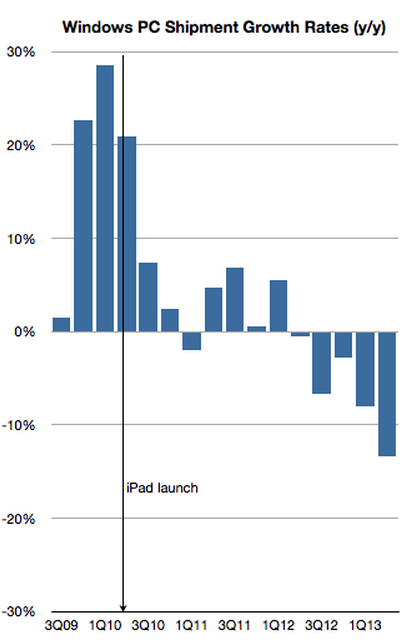
— Dropoff in PC Sales Is Accelerating and Tablets Are the Culprit, Says IDC

— In mature markets, the PC is saturated. And that’s where tablets are secondary devices. Shim says in emerging markets tablets are going to be primary devices. If the tablet takes off there, that kills the traditional PC’s chances of ever growing again.
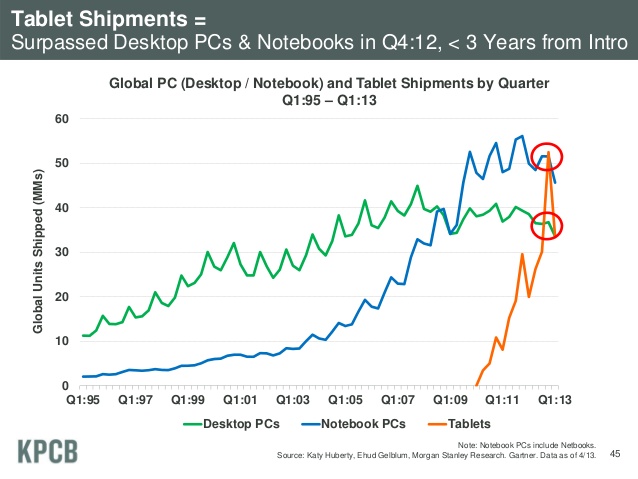
— …for the 4th quarter PC sales declined by almost 5% according to Gartner research, and by almost 6.5% according to IDC. Both groups no longer expect a rebound in PC shipments, as they believe homes will no longer have more than 1 PC due to mobile device penetration, a market where Surface and Win8 phones have failed to make a significant impact or move beyond a tiny market share.
— In the model IDC used to forecast the 7.8% decline, the second quarter — which ended June 30 — was to be down 11.7%, a smaller drop than the first quarter’s historic 13.9% plunge. Shipments in the third and fourth quarters, meanwhile, would decline 4.7% and 1.6%, respectively, from the same periods in 2012.
2) Mobile is ascendant
“The best way to predict the future is to invent it.” ~ Alan Kay
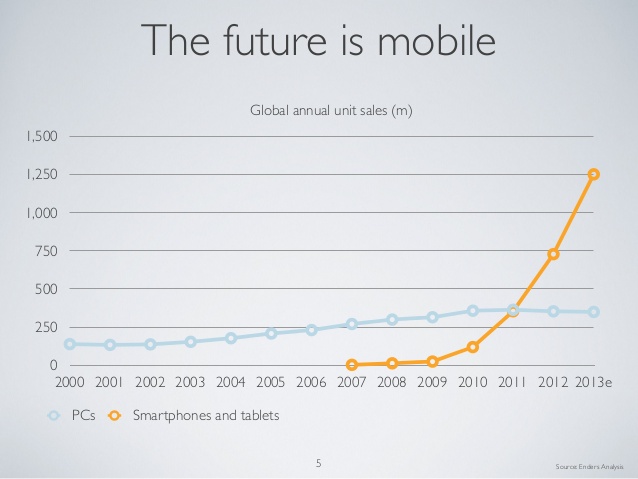
— Half of U.S. adults now own a tablet or smartphone, Pew study finds
— …mobile devices — in particular iOS and Android — will continue to cannibalize PC sales throughout the year. Put simply, consumers and enterprise buyers prefer to spend their money on post-PC devices rather than on PCs.
— Next year, tablet sales will beat notebook sales for the first time ever, says NPD’s DisplaySearch. It is projecting tablet shipments of 240 million units versus notebook shipments of 203 million units. That’s 64 percent growth for tablet versus a 5 percent decline for notebooks.
— IDC: Tablets to outsell notebooks in 2013, all PCs in 2015
— The latest prediction from NPD DisplaySearch shows just how quickly the market has changed. It was six months ago, in July 2012, that the same organization predicted that it would take until 2016 for tablets to surpass notebook shipments.
3) Windows Phone 8 sales have been disappointing
I wish developing great products was as easy as writing a check. If that was the case, Microsoft would have great products. ~ Steve Jobs
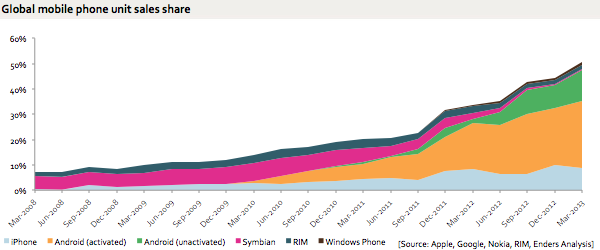
Source: Ben Evans
— iOS and Android comprised 92.3% of Q1 2013 smartphone shipments
— According to Murtazin, Microsoft’s royalty fees from licensing the Windows Phone OS to manufacturers like Nokia, HTC (2498) and Samsung (005930) are being given back to these companies in the form of marketing dollars. In Nokia’s case, an arrangement similar to the one Murtazin describes is a matter of public record, as per the company’s 2011 annual report
— Windows Phone gets no traction despite the Nokia deal and RIM’s collapse
— Manufacturers reportedly ignoring Windows Phone due to OS fees… and Nokia
— Rumor: Microsoft paying $100,000 to some Windows Phone app makers?
You won’t help shoots grow by pulling them up higher. ~ Chinese proverb
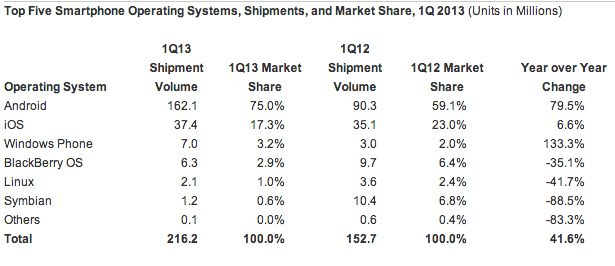
4) Windows RT sales have been disappointing
It is perfectly monstrous the way people go about nowadays saying things against one behind one’s back that are absolutely and entirely true. ~ Oscar Wilde
— …Gottheil dubbed the RT tablets a “meta-tweener,” a “tweener between a tweener (Windows 8 x86) and a pure tablet like iPad,” he said. … “I don’t think Windows 8 RT can be successful unless and until its price is much lower.”
— Microsoft slashes Surface RT prices by $150 as it flounders against Apple’s iPad
— Lenovo released one of the few PCs that ran Microsoft’s ARM-based Windows RT operating system last fall with the 11 inch Yoga 11 notebook-tablet hybrid. Now it looks like Lenovo is phasing out its lone Windows RT product, as it no longer sells the Yoga 11 on its own website.
5) Microsoft Surface sales have been disappointing
To change and to improve are two different things. – German proverb
— Microsoft’s Surface Experiment Has Fallen Flat
“Perfection is the goal we’re going for, and that perfection comes with trade-offs,” said Panos Panay, general manager of Surface.
The above statement is “perfectly” ridiculous.
Someone at Microsoft needs to invest in a dictionary.
6) Third-party Windows 8 tablet sales have been disappointing
Bad engineering is solving a problem that you didn’t have in a way that you don’t understand.
— …(A)t a time when buyers seems price-sensitive, Wu finds the $500 to $1200 price tags slapped on Windows 8 hardware to be “uncompetitive” when compared to Android with prices as low as $99, and the iPad mini which starts at $329.
— Windows 8 tablet sales have been almost non-existent, with unit sales representing less than 1% of all Windows 8 device sales to date, NPD said, excluding sales of the Windows Surface tablet.
— Windows 8 device sales have not met Redmond’s internal projections, and the company is blaming it on lackluster hardware from OEMs.
7) Ultrabook sales have been disappointing
Imitation is a good servant, but a bad master.
— In October, IHS iSuppli downgraded its estimate of 2012’s ultrabook sales, cutting its projections by more than half from 22 million to 10.3 million, citing too-high prices. iSuppli argued that sales won’t take off until prices fall toward the $600 bar, perhaps in 2013. … The problem for Microsoft is that the outlook for ultrabooks, which the Surface Pro emulates, is dim. Windows ultrabook sales have been disappointing this year, and show little sign of improving sans dramatic price cuts.
— NPD: Apple’s MacBook Air dominates with 56% of U.S. thin-and-light notebook market
8) Windows 8 adoption has been disappointing
I heard that if you play a Windows 8 CD backwards, you’ll get a satanic message. But the most frightening thing is that if you play it forward, it installs Windows 8.
— The Windows 8 Sales Data Is In, And It’s Bad News For Microsoft
— Windows 8 continues to fail
— Windows 8 Is Failing to Beat Windows 7… And XP… And Even Vista!
— Worse still, Windows 8’s month-over-month growth rate is lagging further and further behind Vista’s dreadful 2007 adoption numbers. When comparing the operating systems when they were first launched, Windows 8’s adoption rate in its first month trailed Vista by just over half-a-percent among PC buyers. Now, in their 8th month out, Vista’s market-share numbers now lead Windows 8 by 3.64 percent. Needless to say, both lag far behind XP and Windows 7’s numbers at similar points in their product life-cycle.
— How bad are Windows 8 sales? In April 2013’s Net Applications numbers, Windows 8 barely crept up to 3.82-percent. That still leaves Windows 8 behind Microsoft’s last operating system flop, Vista, after seven months in the market. Windows on tablets fared even worse with touch-screen-based Windows 8 devices and Windows RT devices coming in at 0.02-percent and 0.00-percent each. The last was not a typo. The Surface RT is now in the running for worst Microsoft launch ever.
— StatCounter’s findings follow a similarly worrying report from NPD this week, which found that Windows 8 had captured just 58% of all Windows device sales since its launch, while Windows 7 captured 83% during the same period.
9) Microsoft App Store growth has been disappointing
“There comes a time in the affairs of man when he’s got to take the bull by the tail and face the situation.” – W.C. Fields
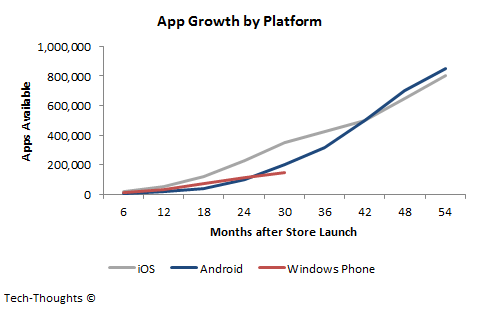
— In a classic chicken-and-the-egg conundrum, the Windows Store needs more Windows 8 customers and Windows 8 customers need more worthwhile apps from the store. Microsoft has failed miserably at attracting compelling content, a painful fact for any developer — or software company — thinking about committing the resources to bring a Metro app to market. How bad is it? … In short, it’s a wasteland.
— Microsoft expected 100,000 Windows 8 apps in 90 days. It took 248
— Sources: Microsoft Is Paying Developers Up To $100,000 To Write Windows Phone 8 Apps
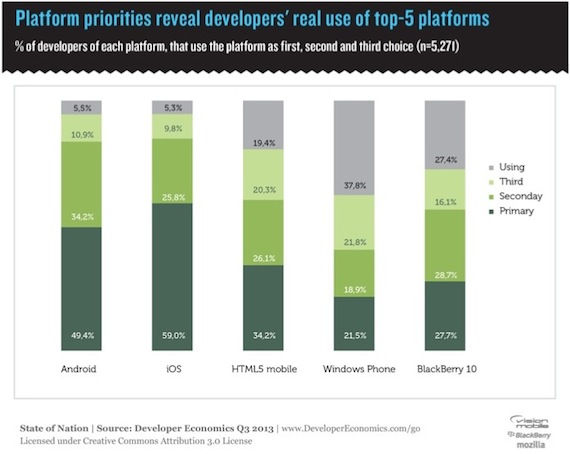
Source
— Windows 8 users are turning to apps, on average, 1.52 times a day. Breaking this down by type indicates that tablet users are the heaviest app users, launching them 2.71 times per day, while touch-screen notebook users launch 47 percent more apps than those on a standard notebook. … Desktop users make the least use of Modern apps. … Soluto crunched the data further, and took a closer look at those who launch fewer than one Modern app a day. Here, the company noticed that a staggering 60 percent of users launch an app less than once a day. Even when it comes to tablet users, the heaviest users of Windows 8 apps according to Soluto, 44 percent of those sometimes go a day without launching an app.
10) Business and Enterprise are moving on without Microsoft’s products or services
If you’re in a card game and you don’t know who the sucker is, you’re it. ~ Anonymous
— Gartner: By 2014, Apple will be as accepted by enterprise IT as Microsoft is today
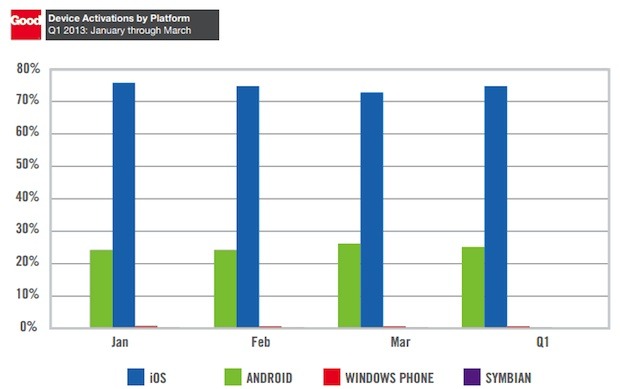
— Thanks To BYOD, Apple Invades The Enterprise
— More Data Showing iOS, Especially The iPhone, Still Killing It In The Enterprise
— Why companies are still deploying iOS apps first
— Fortune 500 Companies Moving to iPad Hits 94%
— Apple’s iOS still dominated the enterprise mobile circuit with 75 percent of total device activations last quarter.
11) Microsoft has lost its monopoly and its monopoly powers
That which has been believed by everyone, always and everywhere, has every chance of being false. ~ Paul Valery
— Forrester Report: Microsoft’s Windows Dominance Is Over
— …and Windows is no longer the dominant end-user operating system when PCs, smartphones and tablets are considered.
— In the greater end-user market, as Mary Meeker, the well-regarded analyst and venture capitalist, pointed out in her May 2013 Kleiner Perkins Caufield & Byers’ 2013 Internet Trends report, Windows is on the decline no matter how you measure it. Apple iOS and Android now have the lion’s share of computing devices, including PCs, smartphones and tablets, with 65-percent share over Windows’ 35-percent.
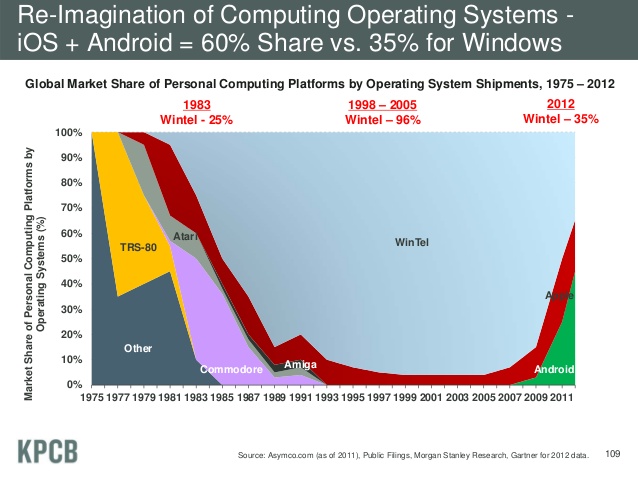
Source
— Microsoft’s mobile operating system share is actually worse than it appears. None of its most recent smartphone/tablet operating systems, Windows 8, Windows Phone 8 or RT. even breaks the 0.01-percent mark on NetMarketShare’s mobile/tablet operating system market share chart. How bad it is that? Android 1.6, with 0.01-percent, does make the chart.

— While Microsoft apologists focus on Windows continuing to be the dominant desktop operating system, they keep missing the two elephants in the room: Windows 8 continues to fall behind Microsoft’s previous top operating system failure, Vista, and Windows is no longer the dominant end-user operating system when PCs, smartphones and tablets are considered.
Men occasionally stumble over the truth, but most of them pick themselves up and hurry on as if nothing had happened. ~ Sir Winston Churchill
— “We had a little bit different expectations for Windows 8 than previous OS launches,” Jeff Barney, VP and general manager of Toshiba America’s PC and TV business, said. “In the past Windows was the only game in town, when it was Windows 7 or Vista it was the big event of the year. These days it’s a different environment.”
— The erstwhile truism You Won’t Get Fired For Buying From Microsoft has lost its luster.
— In the consumer market, we expect to Apple to gain share as the younger generation has grown up on Apples at school. … Pretty soon it could be that the ‘rebels’ will be the Windows users rather than the Mac users.
12) Microsoft is dependent upon legacy products – Windows and Office – for the bulk of its profits
There is only one boss: the customer. And he can fire everybody in the company, from the chairman on down, simply by spending his money somewhere else. ~ Sam Walton
— Microsoft makes more than 75% of its profits from Windows and Office. Less than 25% comes from its vaunted servers and tools. And Microsoft makes nothing from its xBox/Kinect entertainment division, while losing vast sums in its on-line division (negative $350M-$750M/quarter).
Microsoft uses a licensing model. A licensing model only takes a portion of the total profits from a sale. In a licensing model, volume matters.
If Microsoft can’t move its Windows and Office products and services onto mobile phones and tablets, well…
Next Week
The first part of this two-part series focused on what’s gone wrong with Microsoft Windows. Next week, I’ll conclude the series by focusing on why Microsoft is in this position and what, if anything, they can do to resuscitate the dead horse that is Windows.












The “invent the future” quote is by Alan Kay.
Also, adding your byline to the clipboard text is incredibly annoying.
“The “invent the future” quote is by Alan Kay.” – Jan I
Thank you for the heads up. I’ve corrected the attribution.
“I heard that if you play a Windows 8 CD backwards, you’ll get a satanic
message. But the most frightening thing is that if you play it forward,
it installs Windows 8.”
That’s hilarious! Great quote.
“I wish developing great products was as easy as writing a check. If that was the case, Microsoft would have great products. ~ Steve Jobs”
ouch
Mr. Jobs had a very sarcastic way of expressing both the truth and his insight.
Off topic, but can’t resist . . . . .
“There is only one boss: the customer. And he can fire everybody in the company, from the chairman on down, simply by spending his money somewhere else. ~ Sam Walton”
I am doing my best to accomplish that, I avoid your stores as much as possible, same for Google.
how has the windows 8 store’s growth been disappointing, it has over 100,000 apps in just 8 months, faster than ios and android
It has not yielded a mass of quality apps, in the long tail and discovery area. Quantity does not equal quality. I’d argue that the iOS app store has the largest collection of quality applications and it is conducive to their developer community, passion, economics, etc.
http://techpinions.com/microsoft-is-missing-apps-the-same-way-they-missed-the-early-internet/16656
“Quantity has a quality all its own.”
— Stalin
“how has the windows 8 store’s growth been disappointing, it has over 100,000 apps in just 8 months” – Son Goku
Take a look at the associated links. No one, not even Microsoft, is claiming that the Window’s 8 store is doing particularly well.
Plus, windows phone launched 3 years ago so of course its going to take some time to get the right amount of apps, keep in mind that ios is 6 years old and android is 5 years old
No one who buys a Microsoft phone, Window RT tablet or Window 8 tablet cares when Microsoft’s store started vis-a-vis iOS or Android. All they care about is the number of quality apps. They’re not going to cut Microsoft any slack just because they started late.
but its not all Microsoft’s fault, its also the developer’s fault for not making good quality apps
“its also the developer’s fault for not making good quality apps” – Son Goku
Dubious, but even if that were true, the customer’s doesn’t care who’s fault it is. They only care if they can download or buy high quality apps.
So why doesn’t microsoft make some flagship apps… that is better than windows media player 8… or IE8.
They have the engineering raw power, they just need someone willing to make a difference.
Is this just an example of rich people trying to milk the last drops by staying managers/leaders/CEOs when they clearly can’t handle the situation?
Similar to the pre-crash car industry perhaps?
one only needs to follow what Balmer has been mouthing off since the iPad and/or the iPhone came out to understand why MSFT is where it is now….
But who cares right? The Street is valuing MSFT higher than AAPL…bizzaro.
assuming (as a developer) that your resources are finite…which of the 3 ecosystem would you develop for if you only had to pick one? pick two?
Also, People still use office, Xboxes, and Windows 7
“You ain’t gonna learn what you don’t wanna know.”—Jerry Garcia
Some thoughts:
On App stores, app numbers:
Paying developers won’t solve one Windows Mobile problem. The long tail favors the big app ecosystems. Tens/Hundreds of thousands of low usage apps that don’t individually have huge usage numbers, but collectively amount to a lot of usage and incentive for using those platforms.
You can really only get this kind of long tail coverage organically. It needs to grow naturally. When I see adds on TV for apps that accompany a service(banking,travel etc…), nearly 100% of them include iOS, and about 90% include android and maybe 10% include Blackberry(I am in Canada). I can’t remember seeing an add that said they also had an app for Windows phone. I am sure they exist somewhere, but this is part of the long tail problem. Most small players can’t be bothered also hitching their wagon to the small platform, the intersection just isn’t worth it for small players to bother with small platforms. Seeing this over an over, reinforces that if I really want full choice of applications, there really are only two mobile choices: iOS and Android. Otherwise you are a third class citizen when it comes to long tail apps.
On Windows decline/importance.
Desktop/Laptop computing isn’t going away, it is adjusting to some new level. IMO that will still be a very significant chunk of the total computing market. I don’t think I am in any way a Microsoft apologist, but I think Microsofts near ownership of this market, still gives them a lot of power. I despise Windows 8, but my desktops will continue to be Windows based, because here there are advantages with going with leader/monopolist in this segment. Win32 Application options are the ultimate in long tail and it is sticky ecosystem. I have a significant investment in compatible software. I think a lot of people in my situation will stick with windows for their Desktop/Laptop machines.
Windows RT:
What more needs to be said? It still makes no sense. At best this might serve as $10 small tablet OS (once they ditch the desktop dependencies) to have a price competetive offering. The current incarnation was a predictable flop long before launch, for reason enumerated everywhere.
“The long tail favors the big app ecosystems.” – Defendor
Totally agree. I don’t think that many people have grasped this essential fact.
“I don’t think I am in any way a Microsoft apologist…” Defendor
Not at all. I think your view is the majority view. However – and I’ll discuss this next week – I think we may have a role reversal going on here. Previously, the only question one asked was whether one’s equipment was Windows compatible. Now, when people buy computers, they want to make sure that they work with their phones and their tablets.
We’ll see soon enough.
Steve Jobs may have indeed used that line about cannibalization, but if he did, he borrowed it from Andy Grove. And Grove practiced it: He got Intel out of a still profitable memory business because he saw it becoming commoditized and he once ran an ad campaign attacking Intel’s top-selling 80286 processor to promote the 386.
Steve Jobs like to repeat great quotes that weren’t his…
…as do I. 🙂
Sorry to be pedantic and nitpicky, but simply withdrawing from the memory business (as opposed to introducing a new product to supplant one’s own successful existing product) is not cannibalization.
You’re right in a strict sense. But the line of thought was the same. Grove saw Micron and Asian chip makers coming after the DRAM business and decided to shift the company’s resources into business management felt would be more profitable over time (good call, as it turned out.) But the billboards showing 80286 with a big red X through the number were a classic of self-cannibalization.
More Surface RT news:
http://www.pcworld.com/article/2044678/surface-rt-tanks-microsofts-earnings.html
“Microsoft fell way short of analyst estimates for its fourth fiscal
quarter, with revenues nearly a billion dollars short of what analysts
had expected.
The culprit? Microsoft’s Surface RT tablets. A lack of sales forced Microsoft to take a $900 million charge”
It’s Surface at large pro and RT. Both are still less than 2m total and I’m not at liberty to say how many they ordered and are still sitting on shelves but its a ton… Way overestimated demand..
Surface RT is where they are taking the write down (so far), and estimates I see publicly are that they ordered million of Surface RT tablets alone.
That is completely baffling.
The RT version of the OS itself is problematic when compared to full windows 8, then add in very lackluster HW (Tegra 3 was a marginal chip), and you have a recipe for negligible sales. Is no one doing risk management at Microsoft?
At least the pro model runs full windows and with i5, can do it decently. But still it will sell in lower volumes because of the price range it lives in.
How many did they say they publicly ordered? I think you missed the number it just say million. They ordered more that than of RT.
Sorry, I was talking about public estimates from others, no real numbers from Microsoft.
Yes that was sales. Sales were just about one million of RT. MSFT ordered quite a bit more from the manufacturer.
It is odd to me that they didn’t write of Pro which is also not selling well. But perhaps the x86 backward compatibility gives them hope it may catch on. Not sure but they will certainly take a loss on that hardware also. Any theory why they didn’t write than one off?
“Any theory why they didn’t write than one off?” benbajarin
Perhaps it was hard enough for them to admit that the RT was a failure. Writing off both the RT and the Pro would have been an admission that their entire Surface program was a disaster.
No, I am talking about the estimates of the unsold stockpile based on the size of the write-down:
http://www.ibtimes.co.uk/articles/492120/20130718/microsoft-takes-900-million-charge-surface-tablets.htm
“Taking the £590m write-down into account, it would suggest that Microsoft has a store of six million unsold Surface tablets.”
Why RT first? I think it is obvious that it is the greater failure. RT the OS has completely failed to launch. Nearly all partners are abandoning that sinking ship.
Another factor is that ARM chips have lowish computing power and are experiencing much greater generation changes in that computing power. Lasts years ARM chip may offer only 50% the computing power of this years, while last years Intel i5 offers 90% the computing power of this years.
Last years ARM looks a lot more obsolete than last years Intel i5 Core, so there is a much greater need to clear the old ARM stock.
Combine the RT issues and the ARM issues and you have much more desperation to clear Surface RT machines.
While that would be enough there is also a possability that MS might aim ARM-RT machines as the only segment where they might make sense: Small sub 10″ tablets. Making the Surface RT even more obsolete.
Microsoft could have simply remained a core software company instead of taking on hardware based companies like Apple. Apple’s business model has been the same since the beginning – keep it all confined and closed. The end user only gets to see the pretty interface. Keep it simple. In the consumer market that is the mantra. Companies which cater to consumers focus on the experience they get. People flock to Starbucks even though Dunken Doughnuts and McDonalds offer cheaper coffee. People still like to buy Nike products despite their price. Because all have what is known as simplicity and consumer appeal. They focus on customer delight than mere satisfaction. They work hard to make sure that customers do not end up figuring things out. Microsoft never had to do all that until now. They were building trucks for the military where looks, elegance, comfort and experience really do not matter. It was the darling of technicians who love to tweak and link wires dangling all over. That market dominated until 2006 after which, the mobile market really took off. Microsoft must have simply focused on building apps for the iOS and Android platforms. If they had made the Office app for the two platforms way back in 2008, imagine the money they would have made. There was a potential to sell it with every tablet no matter who made it. They could have sold it with a subscription and watched money fall through the roof into their coffers. Microsoft needs to make only one change – Fire all the old timers from the top hierachy and hire people from outside who know how consumer market works. Or they will continue to burn all their cash out.
“They work hard to make sure that customers do not end up figuring things out. ” – Mauryan
After reading your post, it’s clear to me that it is actually you who are the one who haven’t yet figured customers out.
Starbucks and Nike and Apple aren’t fooling anyone. They’re serving their customers.
Just because you don’t understand that doesn’t mean that it can’t be understood.
Count me as the last person in the US who hasn’t been to Starbucks.
As for Nike, they make crap. I bought a pair of their shoes, and they fell apart within a month. Fool me once, shame on you. Fool me twice, shame on me. i won’t be fooled again.
John, like you, I was a Mac guy for 20years (1984 to 2004) and I even worked for Apple as a K12 Enterprise Sales rep.
Unlike you, I have switched completely to Microsoft Windows Phone and Windows 8, and no matter how dire the MS numbers look right now, MS will come out of this on top. Only someone who is not paying attention cannot see what is going on.
I remember the introduction of Windows 95 as the death of Apple. I owned a custom Apple software development company and EVERYONE I talked to told me that Apple was over and that I should get out. I remember telling everyone back then that Apple wasn’t a technology, but rather a religion (cult), that as long as the company produced equipment, there would always be a faithful audience… and I was right! Apple needed a couple of “killer” products: iMac, iTunes, iPod, iPhone, etc and now they are back on top.
Contrast that to Microsoft today. All the numbers you present make Microsoft look like they are going under. That’s wishful thinking for an amateur.
Let’s look at the history:
After Windows 95, Microsoft caught the “internet” bug and freaked out about Netscape. To counter what they saw, they bought the Internet Explorer (IE) code and gave it away “for free.” By Windows 98, the move was to INTEGRATE IE into EVERYTHING. The web browser was going to be the “user interface” for all of their products. That’s when Netscape, Sun, Apple and everyone else started freaking out. Next thing you know Microsoft is being investigated by the DOJ as a monopoly. A few years later, they are convicted and their punishment is not the “breakup” many were hoping for, but rather, a 10 year probation requiring a divisional “firewall” between their product groups.
Say what you want about Steve Ballmer, but the punishment designed to “kill” Microsoft only made them stronger. In 2003, I was at an Apple National Sales meeting where Tim Cook stated that once Microsoft puts Active Directory into a company, they are there for life. During those 10 years (2002 to 2012) Microsoft entrenched itself into corporate America and they are still a monopoly there today. I don’t care what statistics you show, there are no large companies using Smartphones for running MS Office (the de facto office suite).
During the last 10 years, when Microsoft was supposed to be withering away, their Revenue and Earnings have steadily grown (Ballmer has had only 1 profit miss in 40 quarters and that was due to a writedown). Part of the reason their stock is “flat” is because they pay a dividend.
Anyway, in 2007, Apple introduces the iPhone and shortly thereafter, Android is announced and the mobile world “takes off.” Microsoft is only 5 years into their punishment and is grappling with the Vista debacle (which everyone wrote was the end of Microsoft). Sinofsky is brought in to fix Vista with Windows 7 and develop Windows 8. Ray Ozzie is the Chief Software Architect and is pushing for Microsoft to become a “services and devices” company with Live (Bing) and Azure.
In 2010, Apple and Android have completely dominated mobile. the iPad comes out and Microsoft is fumbling about with Windows Phone which is announced in June and ships in October. Apple is almost done with the iPad 2 and Microsoft has just put a dagger into Windows mobile and introduced the “metro” user interface. ALL of the Press can talk about is the growth of Apple and the beginning of the death of Microsoft. Microsoft is on year 8 of its probation (which no one is talking about) and still has not missed either a Revenue or Profit target (which no one is talking about).
In 2011, Apple is pushing forward with new iPhones and iPads. Samsung is quietly beginning its dominance of Android which is starting to explode and Microsoft is barely getting Windows Phone 7.5 out the door. Windows 7 becomes a verified hit (which no one is talking about). Then in June, Microsoft introduces Windows 8 and I am blown away. Finally, Microsoft “gets” design with a nod to BauHaus (le Corbusier and Mies van der Rohe). For touchscreens, no less, and I see the “writing” on the wall. One year left of probation (which no one is talking about).
The pundits go crazy. Microsoft has finally blown it with Windows 8. The VERY same pundits who “hated Windows and the mouse” after DOS also “hate Windows 8” and I laugh.
In 2012, the tech press is eating Microsoft alive, Windows 8 is a failure and to make matters worse, the entire desktop PC industry is sinking faster than a rock. October 2012, Microsoft finally releases Windows 8 and shortly thereafter Ballmer announces that Microsoft is NO LONGER in the software business (at the very end of their probation which no one is talking about.)
Now it’s 2013, and pundits like you are having a field day with statistics. But here’s what you just missed. Microsoft can NO LONGER EVER BE BUSTED as a MONOPOLY in the software business because they are no longer in the software business. What Tim Cook stated is STILL TRUE today, once Microsoft get Active Directory into a company, they are there for life. 90% of the world’s corporations are using Active Directory (which no one is talking about). Microsoft buys Skype and is no integrating Bing into ALL OF it Products. There are NO MORE Divisional Firewalls and because MS is third in mobile, NO ONE including yourself is calling them a monopoly. THAT’S A HUGE MISTAKE.
Unlike 90% of the pundits who write about Technology, I had to carry a QUOTA as an Apple Rep AGAINST Microsoft and their partners. They are a FORCE to be reckoned with and now they are about to do the VERY thing the DOJ tried to stop them from doing with IE, only now it is Bing.
Microsoft has 1,600,000,000 active Windows licenses in various stages of upgrades. They are still the dominate marketshare in Desktop Office and have transitioned the ENTIRE Office Suite to the web (3 years ago). And because of “bad press,” no one is paying attention to them anymore.
The are the ONLY company on the planet to compete at EVERY level of the software business and in EVERY market. They are the ONLY company on the planet that has a touch OS which can scale devices from 4″ inches to 82″ on up. They have $77 Billion Dollars in the bank, and you think they are going away? They have the number 1 game console, the number two Search Engine (which no one is talking about). And they know how to kick the crap out of competitors.
Here’s my prediction:
The “sleeping dragon” has awoken. Apple and Google, the two LEAST ENTERPRISE FRIENDLY companies “validate” the BYOD market and in 2014 you will begin to see the tide change back to Microsoft.
I’m just sayin.
“That’s wishful thinking for an amateur.” – Ric
That is how your long winded post comes across.
The facts are simple. The desktop market is declining in real numeric terms (for 5 consecutive quarters now). That market is Microsofts main cash cow, so Microsoft revenues are starting to decline with it.
Microsoft isn’t just going magically spring back and reverse this trend. Desktops will likely decline to some new smaller portion of the market permanently, or even a long drain down as younger generations have little to no interest in traditional desktop PCs.
Microsoft is casting about for alternate revenue streams to make up for the reality of the declining traditional desktop market. They have ZERO traction in smartphones and tablets so far.
So while I don’t think Microsoft is going away, there may be an adjustment to lower earnings/market cap reality.
Microsoft could stage a comeback, but it seem extremely unlikely that it would be with any product the public has seen. They need a new disruption, to reverse the very real trends that are pulling them down.
Defendor, thank you for validating my post.
The “amateurs” I was referring to are the pundits/bloggers who have never directly competed against Microsoft in a business setting. My experience has been that many pundits “talk the talk,” but very few “walk the walk.”
They just “echo” what they read elsewhere but haven’t really seen these things with their own eyes.
The problem with this post and the statistics is that they are meaningless when compared to the “assets” I listed above. Even your response can be argued against:
” The desktop market is declining in real numeric terms (for 5
consecutive quarters now). That market is Microsofts main cash cow, so
Microsoft revenues are starting to decline with it.”
That’s not exactly correct. Microsoft is a diversified corporation and gains revenue from multiple sources. Even after a terrible last quarter for PC hardware manufacturers, Microsoft met their Revenue target. Even this quarter, Microsoft was on target for Revenue and got hammered on Earnings because of Surface RT inventory adjustment.
“Microsoft isn’t just going magically spring back and reverse this
trend. Desktops will likely decline to some new smaller portion of the
market permanently, or even a long drain down as younger generations
have little to no interest in traditional desktop PCs.”
WHY NOT? What makes you think that the market can’t evolve because it already has:
While Desktop PCs are in decline, NOTEBOOKS, TABLETS and HYBRIDS are growing and Microsoft is STILL dominating that area.
If you are simply looking at “devices,” then yes, ANDROID is the clear winner right now. But NOBODY predicted Android 5 years ago nor did they predict the iPhone before it shipped. Back then, ALL the tech pundits were on the “Crackberry” wagon, and iPhone came out of “nowhere” and smoked everyone.
What the pundits are missing is what I am actually seeing with my own eyes. Corporations are NOT GETTING RID of MICROSOFT. What they are doing is buying iPads and Android tablets as pilot programs. Once their pilots are complete, don’t be surprised if they move back to Windows tablets because unlike Apple and Google, Microsoft is ENTERPRISE “friendly.” How do I know? Because I was an Apple Sales Rep in the Enterprise.
Personally, I think Apple makes the superior solution, but corporations don’t care about that. What companies want is what Microsoft offers… “Cheap and Familiar.”
In addition, Microsoft’s secret weapon (which no one talks about) is their Partner program which has over 600,000 members from Sole Proprietors to Fortune 100 Companies. All of whom have a vested interest in seeing Microsoft succeed.
But all of this misses my point. I was simply trying to state that Microsoft is still a monopoly whether anyone likes that or not and they have just been given the opportunity to do something no one thought was possible which is to INTEGRATE ALL OF THEIR PRODUCTS. The very thing the DOJ was trying to stop.
I tell my clients all of the time, “Love Microsoft or Hate Microsoft, just don’t IGNORE Microsoft.”
Ric, I just wanted to thank you for your insightful comments. I hope you keep coming back to our site and adding to the discussion.
Let me second Ben’s remarks. While I disagree with you, I hope you’ll come back and disagree with me many more times in the future. Hopefully, we’ll learn together.
“…you think they are going away?” – Ric Frederick
Here’s what I said: “No reasonable person is arguing that Microsoft is going away. What rational people ARE contending is that Microsoft is becoming irrelevant in the front end – the consumer facing portion – of the personal computing space.”
“They are the ONLY company on the planet that has a touch OS which can scale devices from 4″ inches to 82″ on up” – Ric Frederick
Actually, they have three totally separate operating systems – one for the phone, one for RT and one for tablets and desktops – that they pretend is one operating system. And that’s a big part of their problem.
“They are the ONLY company on the planet to compete at EVERY level of the software business and in EVERY market… – Ric Frederick
Actually, they are dominating desktops (and notebooks) but they’re not competing very well in smart phones and they’re not competing at all in tablets.
“(Microsoft is) about to do the VERY thing the DOJ tried to stop them from doing with IE, only now it is Bing.” – Ric Frederick
Wow. Did you know that this quarter Microsoft “only” lost 240+ million on their internet services devision? Microsoft isn’t going to win search. The only reason BING even exists is because Microsoft subsidizes if for over a billion dollars a year.
And yet Mr. Ballmer somehow manages to keep his job, stumbling from one reorganization to another.
Clearly Steve Ballmer has the support of Bill Gates. This reorganization is proof that he’s totally in charge.
As far back as the Longhorn/Vista debacle, Microsoft started to look like GM to Apple’s Toyota and I sold all of my (meagre) MS holdings. As technology in your industry advances, remaining competitive means you have to risk alienating your customers as you introduce new technologies: i.e. you have to be willing to win your customers over and over again. MS and GM were too scared or arrogant to do this and their product stagnated; they were rightly perceived as technology laggards. Two devastating effects: the next generation of potential customers shun you and your most creative and talented engineers and designers get frustrated and leave.
I think the iPhone was just the prologue.
The exact moment the Wintel empire fell was when Steve Jobs revealed the iPad price.
This is my first time pay a quick visit at here and i am really happy to read everthing at one place
Thank you for great information. I look forward to the continuation.